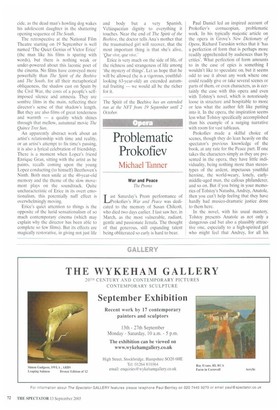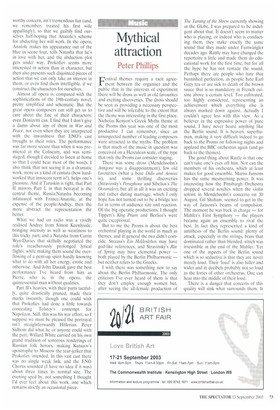Problematic Prokofiev
Michael Tanner
War and Peace The Proms
I:st Saturday's Prom performance of Prokofiev's War and Peace was dedicated to the memory of Susan Chilcott, who died two days earlier. I last saw her, in March, as the most vulnerable, radiant, gentle and passionate Jenufa. The thought of that generous, still expanding talent being obliterated so early is hard to bear.
Paul Daniel led an inspired account of Prokofiev's cornucopian, problematic work. In his typically majestic article on the opera in Grove's New Dictionary of Opera, Richard Taruskin writes that it 'has a perfection of form that is perhaps more readily apprehended by audiences than by critics'. What perfection of form amounts to in the case of epics is something I wouldn't like to speculate on, but it seems odd to use it about any work where one could readily give or take several scenes or parts of them, or even characters, as is certainly the case with this opera and even with Tolstoy's novel, which is notoriously loose in structure and hospitable to more or less what the author felt like putting into it. In the opera, the inspiration seems less what Toistoy specifically accomplished than his example of a surging narrative with room for vast tableaux.
Prokofiev made a skilful choice of scenes, though they do lean heavily on the spectator's previous knowledge of the book, at any rate for the Peace part. If one takes the characters simply as they are presented in the opera, they have little individuality, being nothing more than stereotypes of the ardent, impetuous youthful heroine, the world-weary, lonely, earlymiddle-aged man, the callous philanderer, and so on. But if you bring in your memories of Tolstoy's Natasha, Andrey, Anatole, then you can't help feeling that they have hardly had musico-dramatic justice done to them here.
In the novel, with his usual mastery, Tolstoy presents Anatole as not only a dangerous cad but also a plausibly attractive one, especially to a high-spirited girl who might feel that Andrey, for all his worthy concern, isn't tremendous fun (and, we remember, treated his first wife appallingly), so that we guiltily find ourselves half-hoping that Anatole's scheme for abducting her will work. In the opera, Anatole makes his appearance out of the blue in scene four, tells Natasha that he's in love with her, and the abduction plot gets under way. Prokofiev seems more interested in action than in character, but then also presents such disjointed pieces of action that we can only take an interest in them, or even find them intelligible, if we construct the characters for ourselves.
Almost all opera is, compared with the sophistications of the 19th-century novel, pretty simplified and schematic. But the great opera composers can still get us to care about the fate of their characters; even Donizetti can. I find that I don't give a damn about any of them in War and Peace, not even when they are interpreted with the inwardness that ENO's cast brought to their roles. The performance was far more secure than when it was premiered at the Coliseum, and was semistaged. though I decided to listen at home so that I could hear most of the words. I also think that not seeing it as a dramatic work, more as a kind of cantata (how hardworked that innocent term is!), helps one's pleasure. And if Taruskin is right, that Part II mirrors Part I. in that betrayal is the central theme, Russia/Natasha becoming infatuated with France/Anatole, at the expense of the people/Andrey, then the more abstract the representation the better.
What we had on radio was a vividly realised Andrey from Simon Keenlyside, bringing intensity as well as weariness to this tricky part; and a Natasha from Catrin Wyn-Davies that skilfully negotiated the role's treacherously prolonged lyrical flights, while making them sound the overflowing of a pent-up spirit hardly knowing what to do with all her energy, erotic and otherwise. And John Daszak gave the best performance I've heard from him as Pierre. who is, in the opera, the quintessential man without qualities.
Part II's heavies, with their parts tactfully, quite drastically pruned, made their marks instantly, though one could wish that Prokofiev had done a little towards concealing Tolstoy's contempt for Napoleon. Still, this was his war effort, so I suppose we must be pleased the portrayal isn't straightforwardly Hitlerian. Peter Sidhorn did what he or anyone could with the part; Willard White carried on his own grand tradition of sonorous renderings of Russian folk heroes, making Kutuzov's apostrophe to Moscow the tear-jerker that Prokofiev intended. In this vast cast there was no single weak link, and the ENO Chorus sounded (I have no idea if it was) about three times its normal size. The evening sped by, not something I thought I'd ever feel about this work, one which remains strictly an occasional piece.



























































































 Previous page
Previous page